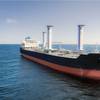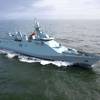Divers attached to the U.S. Navy Diving Team, Mobile Diving and Salvage Unit 1, Detachment 1 (MDSU 1 DET 1), and the Republic of Korea (ROK) Navy Diving Team found common ground underwater during training off the coast here March 22-30.
Deployed from Naval Station San Diego, MDSU 1 divers conducted training that involved integrating with the ROK Navy divers to practice cutting and welding operations, force protection, side-scan sonar operations and pier evaluations.
Lt. Stephen Schwedhelm, officer in charge of MSDU 1, described the importance of pier evaluations, which he describes as sending divers in the water to evaluate the structural integrity of the pier.
“This training teaches us how to provide capability to clear out damaged pier areas so ships can safely pull into port,” said Schwedhelm.
Schwedhelm also said that speaking different languages was not a barrier for this exercise.
“We share a common language with diving, which involves hand signals,” Schwedhelm said.
Navy Diver 2nd Class Tim Mitchell conducted pier-side dives in search of limpit mines with his ROK counterparts and feels the exercise involved more than just training.
“We had the opportunity to have dinner together during this exercise. It’s been a good experience. I feel like we are all divers here and that makes us a family in that regards,” Mitchell said.
The combined exercise was part of the annually scheduled spring exercise cycle involving two exercises -- Reception, Staging, Onward Movement & Integration and Foal Eagle 2007 (RSOI/FE 07). The Combined Forces Command in Korea routinely conducts these field exercises and their computer simulated components to train and evaluate ROK and U.S. interoperability while preparing and mentoring junior military personnel and exercising senior leaders.
Schwedhelm felt that working with the ROK Navy Divers during this annual exercise was an eye-opening experience.
“In the United States, we focus on expeditionary warfare. Here it is more salvage-based. We were able to share our knowledge during this training here,” Schwedhelm said. “We have grown a tremendous amount of respect for them [ROK Navy] since arriving. I think everyone of my guys will walk away very impressed with the ROK military. We look forward to coming back here again.”
By Mass Communication Specialist 1st Class Lisa Wassilieff, Commander U.S. Naval Forces Korea Public Affairs
Sponsored Content
Innovative Hull Maintenance: Profitable & Green

Subscribe for
Maritime Reporter E-News
Maritime Reporter E-News is the maritime industry's largest circulation and most authoritative ENews Service, delivered to your Email five times per week












